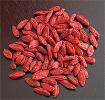Superberry may be squashed by EU rules
The Times, UK. February 20, 2007 (http://www.timesonline.co.uk/tol/news/uk/health/article1409776.ece )
Goji berries, the latest super-food advocated by celebrities such as Madonna, Kate Moss and Liz Hurley, may have to be removed from sale.
The berries, full of antioxidants, vitamins and minerals and little-known on the high street two years ago, have become such a fashionable “miracle” food that they have caught the attention of the regulators.
The Food Standards Agency (FSA) has warned supermarkets and health food shops that it may ban the fruit unless it receives proof that the berry has been commonly eaten in Britain, or another European Union country, for more than ten years.
The move follows a sudden boom in sales of the berries, said to help to combat heart disease, cancer and skin damage from the sun — even though they have been eaten for centuries in China and other parts of Asia, where they are known as wolfberries. Only 18 months ago the goji berry was found in health food shops and Chinese supermarkets but was little known in the big chains.
But after endorsement by Gillian McKeith, a television nutritionist, and the launch by Tesco of a new range of goji berry dried fruit mixes and cereal bars, they are now big business.
Health-conscious consumers eat the small red dried berries as a snack or sprinkle them over muesli. Others eat them in bars or in packs of mixed nuts and they can also be used like sultanas and raisins in baking.
They are referred to as “natural Viagra” and can cost as much as £30 per kilogram. Some organic bags cost £4.99 for 150 grams.
In January, five tonnes of the berries were imported from China and about 35 tonnes are being shipped next month.
A number of suppliers contacted the agency to check whether the goji berry had passed EU regulations as a safe food. This prompted the food watchdog to check.
If it cannot be proved that the berries have been commonly eaten in Britain since before 1997, the berries and associated products must be withdrawn from sale on March 23. Importers and manufacturers then face a two-year reapproval process.
Until the FSA has proof that the berries are commonly eaten, supermarkets and other retailers have been told to wind down stocks and not to reorder products containing the berry.
The watchdog accepts that there is no immediate threat to health but it must follow the EU rules.
Last week it wrote to retail associations and food companies asking for evidence that people ate goji berries within the EU before 1997 and has asked other EU member states for information. However, tracking the sales history of the berry may prove troublesome as the two leading Chinese supermarket chains keep paper-work for only seven years so do not have a ten-year audit trail.
The National Association of Health Stores and the Health Food Manufacturers’ Association are attempting to prove the case.
A spokeswoman for the FSA said that it wished to hear from companies about goji berry sales, including information on any missing data.
In the European Union, a food is judged to be novel if it was not eaten in a significant quantity in Europe before May 1997.
According to the EU Novel Foods Regulation new foods must be shown to meet three criteria before they can be authorised for sale: they must not be unsafe, their labelling must not be misleading and their nutritional quality must not be inferior to other similar foods that they could replace.
‘Miracle’ foods
— Goji berries, above, to help to combat heart disease; flax seeds, to guard against some cancers; garlic, to reduce cholesterol; oily fish, for the brain and bones
Source: OrganicFood.co.uk








Comments
your voice counts
There are currently no comments on this post.
Your voice counts
We welcome your comments and are very interested in your point of view, but we ask that you keep them relevant to the article, that they be civil and without commercial links. All comments are moderated prior to being published. We reserve the right to edit or not publish comments that we consider abusive or offensive.
There is extra content here from a third party provider. You will be unable to see this content unless you agree to allow Content Cookies. Cookie Preferences